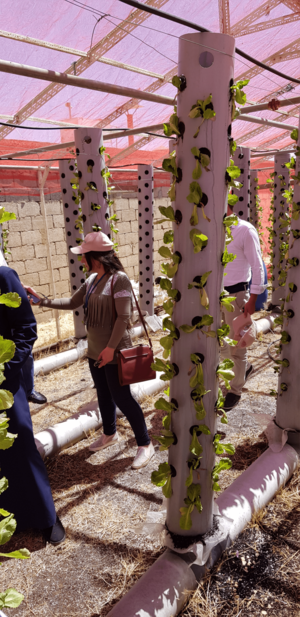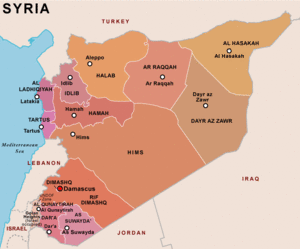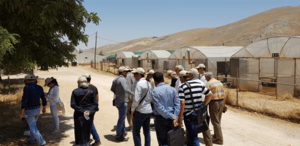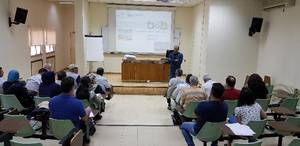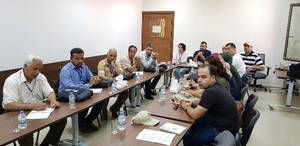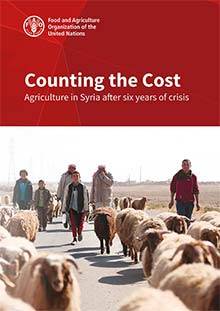Syrian agricultural experts refresh their crop management and seed production skills

Terbol, Lebanon, 24 June to 2 July 2019. Like many arid/semi-arid countries, the Syrian Arab Republic is affected by climate
change. Exacerbating this problem, as a country suffering the effects of prolonged conflict, Syria also faces social, economic and environmental challenges. As such, the agricultural sector has been devastated by the loss of cultivated land, destruction of farm machinery and irrigation systems, shortages of and high costs of farming inputs and fuel, severely damaged infrastructure, compromised power supplies and out-migration of farmers towards more secure areas.
The Syrian crisis has affected the capacity of the Syrian agricultural experts to address farmers' immediate needs. Since March 2017, the "Training for All" project has been started, and as of January 2018, UNDP, UN Habitat, FAO, UNFPA and WHO initiated capacity building activities to address the capacity-building needs in a way that enables the agricultural sector to recover and achieve food and nutrition security for the rural communities, internal displaced populations and urban consumers.
Despite eight years of crisis in Syria, agriculture remains a key part of the economy. The sector still accounts for an estimated 26 percent of gross domestic product (GDP) and represents a critical safety net for the 6.7 million Syrians – including those internally displaced - who remain in rural areas. (FAO 2017: page 3).
However, agriculture and the livelihoods that depend on it have suffered massive loss. Today, food production is at a record low and around half the population remaining in Syria are unable to meet their daily food needs. Against this background, ICARDA in collaboration with FAO organized a Training course on Crop management skills and seed production.
Matching the training with national priorities
The training course on crop management skills and seed production had an emphasis on conservation agriculture. The training targeted 15 Syndicate of Agricultural Engineers for eight days in Lebanon (Terbol Station).
The objective was to train those target audiences in recent classical techniques for crop management and seed production. The participants were selected by FAO Syria and their counterpart which made sure the trainees came from all over Syria: from Damascus, Hassakeh, Deir ez-Zor, Swaida, Daraa, Raqa, Aleppo, Homs and Hamah. The training was preceded by a field visit and farmer field days in Aleppo,Homs, and Tartous in Syria.
The training topics were related to the national priorities in improved food and nutrition security. The training topics focused
on: sowing rates, sustainable water management, weed control, pests and disease management, FAO concepts on Save & Grow, conservation agriculture, post-harvest treatments to reduce post-harvest wastes and seed production practices.
The water management module coincided with the training of 35 Lebanese farmers in Qab Elias (Lebanon, 26 June 2019) by water and crop scientists and sociologists from ICARDA. This workshop was part of the project ‘Social Stabilization through Comprehensive Agricultural Support for Refugee Host Communities,’ also funded by the Government of Japan.
On return the trainees will train other experts or targeted beneficiaries in a cascade way, which will have an impact that exceeds the immediate result of the training.
Video interviews: (transcript)
Interview with Ms. Rawan Kamal Abu Hamra from Om Zeitoun, Sweida in Syria:
Q1: You studied agriculture engineering for five years, then worked as extensionist for another 5 years, and you came to this training. How do you compare this training with your previous experiences?
University was a preparatory stage to agriculture sciences, and my five years in extension was not effective enough because of the Syrian crisis. This training was very helpful to gain many useful and practical technologies, new ideas and concepts that we can (as extensionist) transfer to farmers which they can implement on the farm.
O2: You come from Sweida. What are the most important delivered technologies in your diverse area?
The concepts of climate smart agriculture and conservation agriculture are very important to stop soil degradation. Phormone traps techniques are helpful to our orchards, and new irrigation technologies are important for our irrigated crops.
Interview with Mr. Hassan Ahmed Issa from Tel Hermez, Hassakeh in Syria.
Q1: What are the main benefits of this training course?
This training was very useful for all delivered topics, especially conservation agriculture. However when we go back to our areas we find nothing to implement on the ground like ZT seeders. In addition to other needed inputs and logistics, it is hard to help poor farmers unless we get support and follow up.
Q2: You mentioned that you lack a follow-up. What kind of useful follow-up would allow you to implement what you learned?
This training should build a network with ICARDA/AREC that facilitates our contacts with trainers, as the duration of the training does not provide sufficient experience to transfer delivered technologies.
Further references:
Download the report: Counting the Cost: Agriculture in Syria after six years of crisis, FAO 2017, 40 pages
The findings of this report revealed that USD 16 billion has been lost in terms of production, along with damaged and destroyed assets and infrastructure within the agriculture sector. The assessment also estimates that, depending on the scenario, between USD 11 to 17 billion would be required to kick-start the recovery of the agriculture sector.
Even though the crisis is not over, the conditions for investing in the recovery of the sector are present in many areas of the country. Such investment will not only reduce the need for humanitarian assistance but also stem migration and encourage the return of migrants. If productive farming areas are neglected, more people will be forced to leave already depopulated rural areas making eventual recovery harder, longer and more costly to achieve.
The international community must start addressing new ways of rebuilding livelihoods during a crisis.
For more information, please contact ICARDA’s Technical Training Officer for Capacity Development Masafumi Tamura [email protected]

